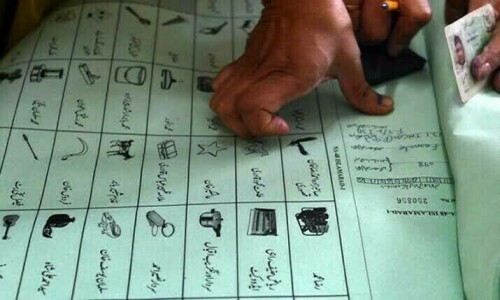The Institute of Islamic Culture has brought out the new issue of its journal Al-Ma’arif with particular reference to its founder and the first director Dr Khalifa Abdul Hakim. In its editorial, the editor Kazi Javed has reminded us that since 1990, the institute annually arranges for a lecture in memory of Khalifa sahib. This year, distinguished scholar Dr Fateh Muhammad Malik had been invited to deliver this lecture and it has been reproduced in this issue.
The editorial also informs us that in addition to this, the institute has also published a volume this month comprising all the lectures delivered so far. It will soon be followed by another volume with Khalifa sahib’s PhD thesis under the title Metaphysics of Rumi. A third book is also in the pipeline, which is a collection of miscellaneous writings dealing with the life and works of Khalifa sahib.
In his memorial lecture Malik tells us about Allama Iqbal’s close relationship with Khalifa sahib. On the occasion of the opening of Osmania University in Hyderabad, Allama sahib had been offered the post of the head of department of philosophy; apologising for not being able to join the university, Allama sahib recommended Khalifa sahib’s name for the post. He wrote, “Khalifa Abdul Hakim, too, is Iqbal in his own way.”
It may be pointed out here that the English name of this institute receded into oblivion long ago. We now like to call it Idara-e-Siqafat-e-Islamia. After decades that Idara has now cared to revive the name of its founder along with his works. The editorial also explains the reason for this. As explained, we are very much in need of Khalifa sahib’s wisdom, who with his liberal thinking may lead us out of the woods of extremism.
Could Islamic socialism be the solution to Pakistan’s problems?
On the other hand, this situation has compelled Malik to turn once again to the forgotten concept of Islamic socialism, which remained, for a few years, a point of attraction for the intellectuals who in those years were engaged in an ideological battle against the religious ideologues known as Islam pasands. The professor nostalgically recalled those years and remembered the intellectuals who were engaged in this battle. As recounted by him, Hanif Ramay, Professor Muhammad Usman and Mohammad Safdar Mir were at the forefront of this ideological battle. In the thick of this battle they turned to the early period of Islam for inspiration and learnt about Hazrat Abuzar Ghaffari, the first Islamic socialist in history. With the meteoric rise of the politician Zulfikar Ali Bhutto and the quick popularity of his party, the battle became worse. Recalling those times, Malik tells us Ramay published an Islamic socialism issue in his journal titled Nusrat. The rival group, in turn, brought out a redoubled volume and a special issue in their journal Chiragh-e-Rah.
However, encouraged by the PPP’s success in elections the Islamic socialists took this success as their own victory. But it was short-lived. Once again we were fated to live under dictatorship. And the newly emerged dictator had appeared armed with his own brand of Islam. Islamic socialism had already receded into the background.
A long time has passed since then, and now Malik proposes reviving the forgotten concept of Islamic socialism. He has traced it back to the early years of Pakistan and recalls the historic occasion when our first prime minister, Liaquat Ali Khan, paid a visit to USA and declared that when the world is divided into two warring camps, Pakistan has chosen for itself a third way which leads to Islamic socialism.
In the same breath he refers to Khalifa sahib’s book Islam and Socialism which was published in those very years under the title Islam and Communism. He has asked us to go through the two chapters titled ‘Islamic Democracy’ and ‘Islamic Socialism’.














































